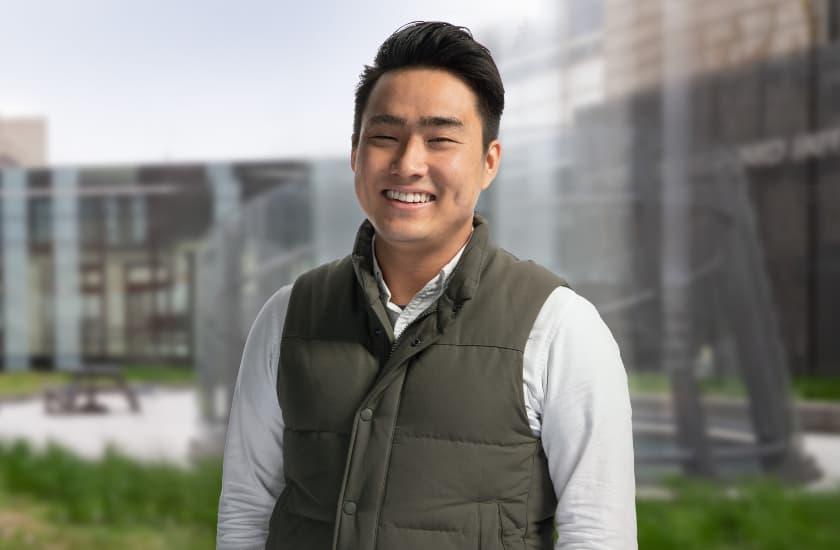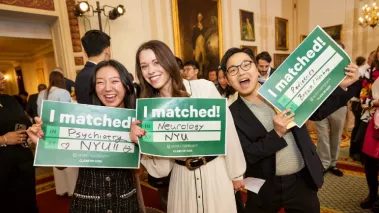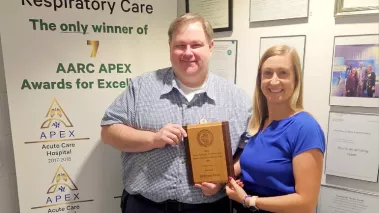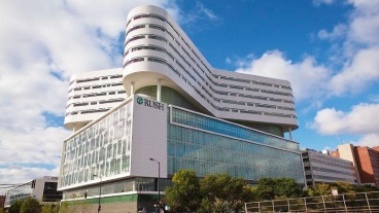For Tim Lee, the decision to become a physician wasn’t just a career choice. He sees it as a necessity.
As a high school art teacher in North Philadelphia, Lee went to work every day fearing yet another member of the community might be lost to gun violence. He desperately wanted to do more to help, and that led him to pursue a career as a trauma surgeon.
Lee, now a third-year student at Rush Medical College, is preparing to care for people who have suffered life-threatening injuries. He spoke about the factors that motivated his career switch, his work as a mentor to new medical students and the advice he has for others who are taking a unique road to a career in medicine.
Tell us about your background.
Tim Lee: I was born in New Jersey and lived in Georgia for a while but spent my formative years in Philadelphia, and I absolutely adore the city. There’s something incredibly special about walking from one side of the city to the other and finding something or someone new every time. It’s a small town masquerading as a big city. I was lucky enough to earn a bachelor’s degree in biology from the University of Pennsylvania, and during that time I got involved in the arts, especially as a means of advocating for social change in our local neighborhoods.
Philly is unofficially the mural arts capital of the world, and there’s no better way to get a message across than on the side of a building. I began tutoring students in art, and that led to a position teaching art and biology to high school students in North Philadelphia.
Gun violence is a national issue but seeing its effect in our community made it personal. As part of the art class I taught, we designed murals that specifically addressed the violence occurring in our community, but murals alone couldn’t bring back the friends and family we all had lost.
When did you decide to change course and pursue medicine?
TL: We were losing too many loved ones to gun violence. I started to realize that as a teacher there was only so much I could do to prevent it. I was doing everything I could to help the students advocate for themselves through art, but what good is that if it can all be taken away in an instant?
The motivation to go to medical school really came from the kids. They kept me on track. They reminded me to study hard for tests and made sure I got my applications in. They would tell me, “You have to go for it.” I still remember telling one of my students that one day we’d work together in the same hospital. Every time I’m on the floors I can imagine her right there with me, and I’m looking forward to the day that she becomes my boss.
You could have chosen a number of different career paths to try and help. Why medicine?
TL: The human body is so resilient, not only mentally but also physically. To understand recovery from catastrophic injuries is a privilege, one that I hope to have for a lifetime. Injuries change but medicine changes faster, and I wanted to be a part of that constant cycle of learning and relearning.
Most importantly, I was inspired by a trauma surgeon in the community, Dr. Amy Goldberg, who took care of many of the students in our school and people in the community who were injured. She is also very active in community initiatives and working with community leaders to find ways to keep gun violence from happening. That is exactly what I hope to do one day as a trauma surgeon.
What was it about Rush Medical College that made you think you could achieve your goals there?
TL: As a former teacher, Rush Medical College’s new curriculum felt like the perfect fit. It champions case-based learning with integrated, real-time proctoring by some of the best physicians the field has to offer. It gave us the opportunity to work with fellow students who have different opinions and varied backgrounds to come to similar conclusions, whether it was a diagnosis or a problem that needed to be solved.
The moment I set foot here I felt the amazing spirit of it all. A lot of schools advertise a group-based learning model, but they don't actually live up to it. Rush felt like the most honest. At Rush I saw a mission to create a new type of medical school — one that really prioritizes how to be an excellent communicator, professional and advocate not only for patients but also for other clinicians.
What are some things at Rush you have enjoyed the most?
TL: Right from the start, I was able to spend time in the trauma bay at Cook County Hospital because of its relationship with Rush University Medical Center. I would spend some weekends shadowing physicians there, and during the week I would work with a team of physicians helping to triage patients in the trauma bay.
Another thing I’ve really enjoyed is the work I’ve done over the past year as a peer tutor for first- and second-year medical students. Each day I dedicate an hour or two to meeting with anyone who wants to talk, whether it’s school related or about day-to-day life. It’s our job as medical students to teach and listen to one another. It’s a little bit of an extension of the work I was doing as a high school teacher. It’s important that we all have an outlet and in the end, we’re only as successful as the team that helped get us there.
Your path to medical school has been unique. As a former teacher and current student mentor, what advice would you give to someone trying to carve their own road to a career as a physician?
TL: Every experience matters. When I was doing art, I would sometimes wonder, “Am I doing the right thing? Am I helping anybody?” But through art I learned the ability to be compassionate and how to truly hear what people were saying. Those experiences make me who I am now and have helped me not only survive but thrive in medical school.
There's this belief that you have to be in love with science from day one, from birth, to be in medicine. It's just not true anymore. There’s an advantage to being in a field like art or education first. To all of the kids who are doing other things — painting murals or skateboarding or traveling the world — I say all of those experiences matter. They truly do.
Once you are in medical school, the skill that matters most is adaptability. It’s the ability to adapt to different situations with different people, cultures, religions and thought processes. Rush is excellent at that because you are thrown into a classroom with a group of people who think differently than you, and you have to adapt. If you are open to others and show kindness to everyone, everything is possible. Rush is the kind of place where kindness begets more kindness.
From administration to physician faculty, there are mentors for everyone here. Jan Schmidt and Dr. Aimee Szewka are the heart and soul of our school and take pride in each and every one of us. Dr. Joanna Kuppy and Dr. Nicole Siparsky are just two more examples of individuals who go above and beyond for their students. They saw my interests and helped me double down on the things I love, helping me get better every single day that I am here. These are the kind of mentors that exist at Rush, and I’m incredibly thankful for that.







